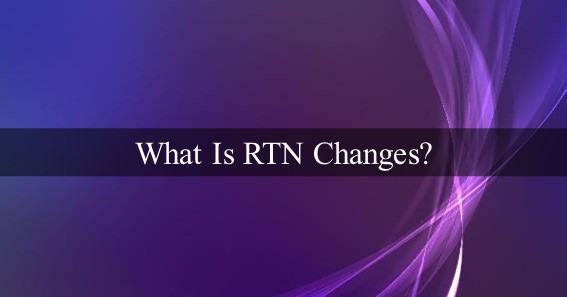Are you curious to know what is RTN charges? You have come to the right place as I am going to tell you everything about RTN charges in a very simple explanation. Without further discussion let’s begin to know what is RTN charges?
In the realm of financial transactions, various fees and charges are associated with different services. One such charge that may arise during banking or financial transactions is RTN charges. RTN, which stands for Return, refers to charges incurred when a transaction is returned or rejected by the receiving bank. In this blog, we will explore the concept of RTN charges, their reasons for occurrence, and their implications for individuals and businesses.
What Is RTN Charges?
RTN charges are fees levied by banks or financial institutions when a transaction is returned or rejected due to various reasons. The charges are typically imposed to cover the administrative costs incurred by the receiving bank when processing and handling failed transactions. These charges serve as a deterrent against insufficient funds, incorrect account details, or other issues that may lead to transaction failures.
Reasons For RTN Charges
- Insufficient Funds: One of the most common reasons for a transaction to be returned is insufficient funds in the sender’s account. If the account does not have enough funds to cover the transaction amount, the receiving bank may reject the transaction and impose RTN charges.
- Incorrect Account Details: Transactions can be returned if the account number, routing number, or other details provided by the sender are incorrect. The receiving bank may be unable to process the transaction and, as a result, impose RTN charges.
- Frozen or Closed Accounts: If the recipient’s account is frozen or closed, any incoming transactions will be rejected. This can happen due to various reasons, such as account holders reporting fraudulent activity or banks taking legal actions. In such cases, RTN charges may be applied.
Implications Of RTN Charges
- Financial Impact: RTN charges can have a direct financial impact on individuals and businesses. The fees are typically deducted from the sender’s account, reducing the available funds. The exact amount of RTN charges varies depending on the bank and the specific transaction involved.
- Transaction Delays: When a transaction is returned, it can result in delays and complications. The funds may not reach the intended recipient within the expected timeframe, causing inconvenience and disruption to planned financial activities.
- Record of Failed Transactions: RTN charges indicate failed transactions, which can affect a person or business’s transaction history. This record may impact creditworthiness and financial reputation, especially if there is a pattern of returned transactions.
Mitigating RTN Charges
To avoid RTN charges and minimize transaction rejections, it is essential to take certain precautions:
- Sufficient Funds: Ensure that your account has enough funds to cover the transaction amount before initiating any payments or transfers.
- Accurate Account Information: Double-check and verify the account details of the recipient, including the account number and routing number, to avoid errors and potential rejection.
- Communication with Banks: If you suspect any issues with your account or anticipate potential transaction rejections, it is advisable to communicate with your bank and address the concerns promptly.
Conclusion
RTN charges are fees imposed by banks when a transaction is returned or rejected due to various reasons, such as insufficient funds or incorrect account details. These charges aim to cover the administrative costs associated with processing failed transactions. It is crucial to be aware of the potential implications of RTN charges, including financial impact and transaction delays. By maintaining sufficient funds, ensuring accurate account information, and staying in communication with banks, individuals and businesses can minimize the occurrence of RTN charges and facilitate smooth and successful financial transactions.
Empower Your Knowledge By Visiting Techyxl
FAQ
What Is The Meaning Of RTN?
routing transit number
A routing transit number is a nine-digit number used to identify a bank or financial institution when clearing funds or processing checks.
What Is The Rt Charge In Bank?
A returned payment fee is a one-time penalty charged by a bank when a customer bounces a check. The bank sends the customer a message indicating that a check has been returned unpaid “due to non-sufficient funds” in the account.
What Is A Bank Mandate Charge?
About ECS Mandate Charges
ECSs are repetitive and periodic transactions done by institutions to make payments towards interest, pension, salary, and distribution of dividends. It is usually used by loan lenders to periodically debit EMIs from the borrower.
What Is The Example Of RTN?
Register Transfer Notation (or RTN) is a way of specifying the behavior of a digital synchronous circuit. An example of high-level RTN is Verilog, and a low-level example is Register Transfer Language. RTN may be written as either abstract or concrete.
What Are EMI RTN Charges?
Loan Prepayment Charges:
4% on Balance Principal Outstanding from 13 to 24 months of EMI repayment. 3% on Balance Principal Outstanding from 25 to 36 months of EMI repayment. 2% on Balance Principal Outstanding beyond 36 months of EMI repayment. Govt Taxes & Levies, as applicable would be charged additionally.
I Have Covered All The Following Queries And Topics In The Above Article
What Is RTN Charges
What Is Nach RTN Charges
What Is Nach Ad RTN Charges In Icici Bank
What Is Nach RTN Charges Bank Of India In Hindi
What Is Ach RTN Charges
What Is Ach RTN Charges Idbi Bank
What Is RTN Charges Sbi
What Is RTN Charges Hdfc
Why Are RTN Charges Deducted
What Is RTN Charges In Hindi
RTN Charges Bank Of India
Ach RTN Charges Pnb
What Is Nach Ad RTN Charges In Icici Bank
RTN Charges Meaning In Marathi
What Is RTN Charges
What does the RTN stand for
What are RTN charges?

